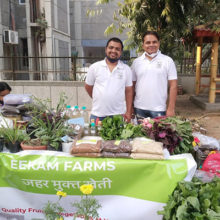
EDITION 5
Friday
June 11, 2021
DOES SOCIAL MEDIA MARKETING REALLY WORK?
Consider this. You’ve just started your business. You are tightly bootstrapped. And yet, you need to market your goods or services. A generation ago it would have been mandatory to use newspapers, television and radio formats but luckily for start-ups now social media is available. And easily so. But does it work? How well? We speak to a few TiE Pune start-ups who share their experiences with Social Media Marketing.

Chetan Rawal
When Chetan Rawal set up Biogenics Labs, a brick-and-mortar diagnostic lab at Wanowri he knew what he was up against. Says he, “being a young diagnostic company with no deep pockets, our approach to marketing was a little different. Rather than using paid campaigns addressed to the masses, we positioned ourselves with clients who had an immediate requirement and would be looking for services like ours.” That meant Google and JustDial where people would search diagnostic services.

Vrishali Kekre Desmukh
As Vrishali Kekre Desmukh, founder Therefore Design (that also offers SMM services and designs products) puts it, “that’s the first and most important rule of marketing on the digital platform. Identify your target audience and know where they will be. Simply spending on bombarding various channels will not help.”
Vrishali feels that SMM is different from traditional marketing in a very basic way. “Traditional marketing is intrusive. It blasts out of your newspaper or TV screen and tells you to buy something. But with SMM this won’t work. You have to give value. State benefits. Be logical about why your product is good, better and so on. In fact, there are two kinds of marketing on SMM. One is brand building which is slow and time-consuming but will give exponential results, and then you have performance marketing where you contact potential buyers and make a sale. Performance marketing will give you immediate results, brand building will take time but work better.”
She gives an example of a user searching for shoes. “If you’ve invested in Performance Marketing you will come among the top 10 in the search, but with brand building your customer knows he wants Nike shoes and will search for Nike specifically.”

Sudin Boraokar
For Sudin Boraokar, founder of AI on the Fly Technologies, a company providing AI based products and services for the Fintech industry SMM was a boon. “We used LinkedIn primarily because we are a B2B company. Facebook, Instagram, etc. are more for B2C. This platform helped us build a network, get in touch with accelerators, incubators that was a help, give us the latest on product innovations, update us on technology.”
But what about generating leads? Sales? Says Sudin, “it gives you many hooks to chase. So, following up on such leads helped us get a conversion rate of about 10%”
Which is really good according to Vrishali. “Though there is no standard formula for conversion rates ultimately an established business looks for cash in hand. So, if you are spending Rs 100 on SMM then you should get a sale of Rs 120 a year or two after SMM. Anything above 1% is considered good for a newbie.”
For Therefore Design it was SMM that was its saviour during the hard days of COVID-19 last year. “Since there was no networking, no exhibitions, conferences, it was SMM that came to the rescue. I think about 80% of our sales is generated from digital marketing.”
The elements of a good SMM campaign according to Therefore Design are
- First target the right audience. Identify the right target profile of the people who may be interested in your product.
- Communicate the benefits of your product. How you solve a problem for your customer
- Have a good mix of content. That is, you should give out knowledge about the product in general and the benefits and ultimately make your sales pitch
- Have a good SEO program.

TiE Nurture Se Mini MBA Ho Gaya

Sanchit Agarwal and Rupesh Tyagi
co-founders Ekam Farms
Profiling Ekam Farms, TiE Pune’s Nurture Mentee
For an engineer, starting a farming business can be quite a challenge. And Sanchit Agarwal and Rupesh Tyagi (who is a biotechnologist by training) set out on this bold road a year and a half ago with their start-up Ekam Farms. Not belonging to a farmer family these two Delhi boys wanted to make their fruits and vegetables as they say “zehar mukt”. Easier said than done.
The problem faced in this business was, says Sanchit, “that local vegetables have bad quality, adulteration and lack freshness. Besides, it takes about 30 hours post-harvest to reach your table. In addition, organic vegetables are a luxury for middle-class people and are priced 2-3 times more. And small farmers lack access to affordable technology”
The duo was lucky that they had the farmers close to the city. “50 kms from Delhi in Hapur” says Sanchit. While they worked with the small farmers to make them adopt good agricultural practices, crop planning etc, they had to get around to finding the market for their produce.
Says Sanchit, “For any start-up there are many things that need clarity and direction. When we joined TiE Pune Nurture Accelerator, we were spread out thin in many directions. Rupesh was looking at increasing yield, trying out different veggies to improve yield, better soil etc. I was trying to figure out channel partners, buyers, vendors, employees, actually all stakeholders. Any founder has to understand how to make the right partnerships that will benefit has business, how to locate markets and so on.”
So first off, Nurture mentors made us understand the value of prioritizing our work, what should be No 1, 2 and 3. Actually Vivek Gupta, Vishaka Agarwal, Sanjay Pradhan and Pratima Kirloskar cut the chaff from the grain so to say. And in a holistic way. So they gave us clarity on what kind of channel partners we should develop since ours is a B2B2C model. It’s a community-based business.
Ekam Farms tried using their friends to contact housing societies nearby to target potential customers. “Instead, they suggested we do it through professionals who serve such societies like say security agencies. That worked out very well”
Like the many other areas of their business, they were helped in “Pratima Kirloskar helped us with a platform to pitch our business and what was the right amount to ask for given our business model.”
While Ekam has a strong farmer network and armed with better insights and guidance from Nurture, they have broken even this year. “In the previous year our business was not growing at the pace we wanted, given the lockdown and its ramifications, but this year we’ve evened out.” They’re very confident about their growth. As Sanchit puts it, “Abhi toh hamara Nurture se MBA ho gaya! Kuch bhi manage kar sakte hain”
Contact us if you have a story to tell: rashmi.ghosh@tiepune.org

